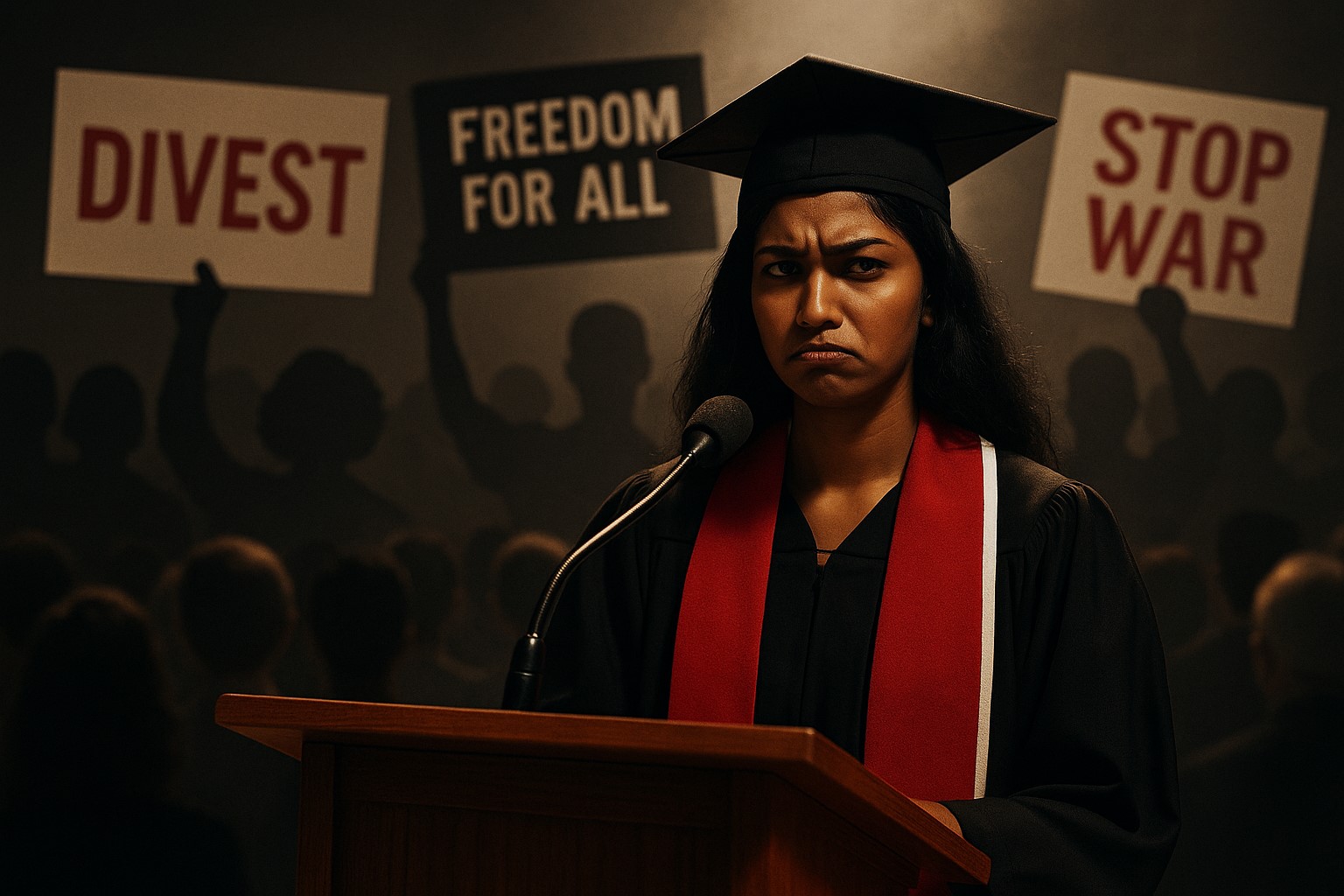
Background: What Happened at MIT’s Graduation
On May 29, 2025, Megha Vemuri, the Class of 2025 president at MIT, used her commencement speech to deliver an unauthorized political tirade. Veering off from her pre-approved remarks, Vemuri accused MIT of complicity in “genocide” due to its alleged ties to Israeli defense entities:
“We’ll carry with us the stamp of the MIT name, the same name that is directly complicit in the ongoing genocide of the Palestinian people, and so we carry with us the obligation to do everything we can to stop it.”
The speech praised campus protests and demanded institutional divestment—all during what was supposed to be a moment of unity and celebration.
The fallout was immediate: many attendees walked out in disgust. MIT barred Vemuri and her family from further commencement activities, citing violation of its “time, place, and manner” restrictions and breach of the pre-approval policy.
First Amendment Limits at Private Institutions Like MIT
Contrary to online outrage, the First Amendment does not apply here. The Constitution protects individuals from government censorship—not editorial oversight by private universities.
MIT, as a private institution, has broad discretion to enforce rules governing speech at official events. While it may claim to uphold academic freedom, those commitments are voluntary and do not create legal obligations. Vemuri’s claim that MIT’s response was an “overreach” is legally hollow. She had no constitutional right to hijack the ceremony for her own agenda.
What If This Happened at a Public School? A Constitutional Deep Dive
Even if MIT were a public university, Vemuri’s speech would still not enjoy constitutional protection. The Tenth Circuit’s decision in Corder v. Lewis Palmer School Dist. No. 38, 566 F.3d 1219 (10th Cir. 2009), is instructive.
In Corder, a valedictorian added unapproved religious content to her graduation speech. The court held that because the speech was school-sponsored, the district had the authority to regulate it. Graduation ceremonies are official events—not public forums—and therefore fall under the precedent of Hazelwood School District v. Kuhlmeier, 484 U.S. 260 (1988). In Hazelwood, the Supreme Court held that schools may exercise editorial control over school-sponsored speech so long as their actions are “reasonably related to legitimate pedagogical concerns.” Id. at 273.
The takeaway is simple: Public schools—and by extension, public universities—can lawfully require prior approval of speeches at ceremonies and discipline students who go off-script. Far from violating the First Amendment, such regulation protects the institution’s ability to maintain order and uphold its educational mission.
This Wasn’t Brave. It Was Just Bad Taste.
Let’s put the Constitution aside for a moment. Vemuri’s conduct was appalling—not because it was political, but because it was grossly inappropriate for the occasion.
Graduation is a once-in-a-lifetime moment for families. It’s not a protest stage. Parents traveled from across the country, and in some cases, across the globe, to watch their children walk across that stage. Many of them have loved ones directly impacted by the very conflict Vemuri decided to exploit. Some may have lost family. Others simply wanted one unspoiled day of pride and joy.
Instead, they were ambushed. Forced to listen. Forced to react. Forced to wonder if this was going to erupt into something worse.
And for what? If Vemuri truly cared about the issue, she could’ve organized a campus panel, worked through institutional channels, or submitted an op-ed. But she didn’t want policy change—she wanted applause. She wanted to go viral. She wanted to make a scene. And like so many self-absorbed young adults craving relevance, she mistook disruption for impact.
The Israel-Gaza conflict isn’t new. It’s been on the front page for months. She wasn’t enlightening the public. She wasn’t offering nuance. She was injecting herself into a narrative where she had nothing new to say, and she did it at the expense of hundreds of other students and families.
Ironically, she likely hardened the views of those who disagree with her—and alienated those who might have otherwise been sympathetic. This wasn’t principled protest. It was indulgence masquerading as activism.
Conclusion
Megha Vemuri’s on-stage performance might win her praise from online echo chambers, but it fails both as a legal argument and as a moral act. MIT, even as a private institution, was well within its rights to take disciplinary action. And if this had occurred at a public university, her free speech defense would collapse under binding Supreme Court precedent—Hazelwood, Corder, and others.
But perhaps more damning than the legal flaws is the selfishness of the act. Graduation is about students, their families, and shared achievement—not personal grandstanding. As any constitutional lawyer or First Amendment attorney should agree: this wasn’t protected speech. It was protected ego.
Image Credit: OpenAI DALL·E. This is an AI-generated illustration and is not intended to depict any real person, including Megha Vemuri.
 Law Office of Jason Ostendorf LLC
Law Office of Jason Ostendorf LLC